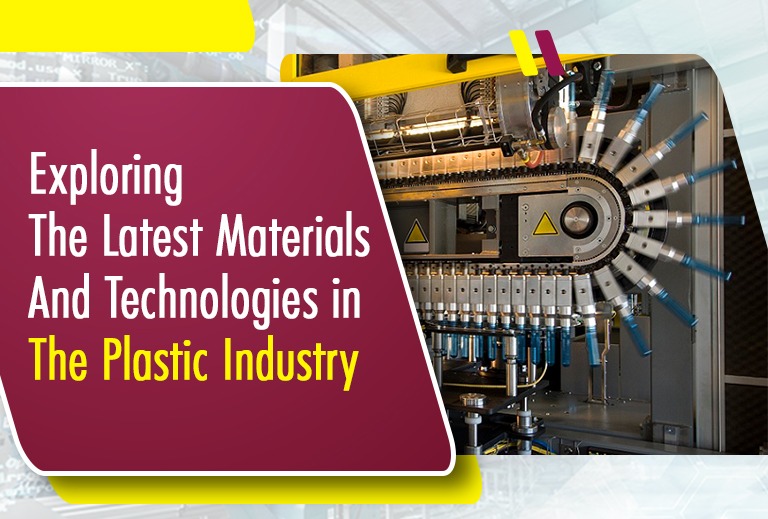Exploring The Latest Materials And Technologies in The Plastic Industry
The plastic industry has come a long way since its inception, revolutionizing the world and becoming an integral part of our daily lives. In recent years, there have been significant advancements in the plastic industry, with a focus on reducing waste, carbon footprint, and promoting a circular economy. In this article, we compile some of the material and technology innovations that are helping the plastic industry reduce waste while promoting a circular economy.
First, let’s look at some innovative plastics:
- Biodegradable Plastics – These include bio-based polymers derived from renewable sources or synthetic polymers with specific properties that enable degradation under specific conditions.
- Recycled Plastics – These plastics help reduce the demand for virgin plastics. Advanced recycling technologies can transform post-consumer plastics into high-quality raw materials for new plastic products.
- Bio-based Plastics – These plastics are derived from renewable resources such as plants, algae, or agricultural waste. They can help reduce greenhouse gas emissions and the dependence on fossil fuels.
- Smart Plastics – These materials possess integrated functionalities that respond to external stimuli. They can exhibit properties like shape memory, self-healing capabilities, or the ability to sense and respond to changes in the environment. Smart plastics find applications in various fields, including healthcare, electronics, and aerospace.
- Nanocomposite Plastics – These materials combine plastic polymers with nanoscale fillers to enhance their mechanical, thermal, or barrier properties. These plastics can be used for lightweight and high-performance applications.
And here’s a look at some revolutionary technologies in the plastic industry:
- Chemical Recycling – This innovative technology converts plastic waste into valuable raw materials or feedstock through depolymerization or pyrolysis. Unlike mechanical recycling, which involves melting and reforming plastic waste, chemical recycling breaks down the polymers into their molecular components, enabling a wider range of plastic types to be recycled.
- Additive Manufacturing by using recycled plastics – 3D printing or additive manufacturing has become a transformative technology in the plastic industry. One innovative application is the use of recycled plastics as feedstock for 3D printers. This approach allows for the direct fabrication of complex parts using recycled plastic materials, thus reducing waste.
- Intelligent Packaging – It refers to the integration of sensors or indicators within plastic packaging to monitor and enhance product quality, safety, and shelf life. These smart packaging solutions can provide information on temperature, freshness, and tampering. They can even interact with consumers through QR codes.
- High-Performance Engineering Plastics – These plastics offer lightweight alternatives to metals, enabling applications in the aerospace, automotive, and medical sectors. They contribute to fuel efficiency, durability, and overall product performance.
Explore these innovative plastics and cutting-edge technologies at PLASTIVISION 2023. This premier event is a gathering of industry experts from the plastic sector, providing an unparalleled platform for knowledge exchange and networking. Mark your calendars for December 7-11, 2023, as the event takes place at the prestigious Bombay Exhibition Center in Mumbai.
To discover more about this highly anticipated event, visit our website or reach out to us via phone at +91 99303 55494 or email at sanjeevani@plastivision.org. Join us in shaping the future of the plastic industry. We eagerly await your participation.
Leave a Reply Cancel reply
Recent Posts
- Understanding The Materials That Are Used To Build Plastic Toys
- All You Need To Know About Food-grade Plastics
- A Glance At The Materials That Boost The Performance Of Plastics
- Understanding The Importance Of Exploring New Business Opportunities In The Plastic Industry
- Understanding The Importance Of Investing in R&D For The Plastic Industry
Categories
- 3D Printing
- AIPMA
- Automation
- Automobile Sector
- Bio Plastics
- Environment
- Innovations In Recycling
- Latest Innovations
- Molds & Dies
- News
- Packaging Industry
- Plastic
- Plastic Application
- Plastic Industry
- Plastic Market
- Plastic Myths
- Plastic News From The World
- Plastic Packaging
- Plastic Products
- Plastic Recycling
- Plastic Solar Cells
- Plastic Toys
- Plastic Waste
- Plastic World
- Plastics
- Plastics And Their Applications
- Plastics In Agriculture
- Plastics In Healthcare
- Plastics In Medical Industry
- Plasticulture
- Processing Machinery
- Recycling Machines
- Robotics
- Uncategorized
- Virtual Reality
Archives
- November 2023 (3)
- October 2023 (2)
- September 2023 (3)
- August 2023 (3)
- July 2023 (3)
- June 2023 (3)
- May 2023 (2)
- April 2023 (2)
- March 2023 (2)
- February 2023 (2)
- January 2023 (2)
- December 2022 (3)
- November 2022 (1)
- October 2022 (1)
- September 2022 (2)
- August 2022 (1)
- July 2022 (3)
- May 2022 (3)
- March 2022 (2)
- February 2022 (1)
- January 2022 (1)
- September 2021 (2)
- August 2021 (3)
- July 2021 (4)
- June 2021 (4)
- May 2021 (3)
- April 2021 (2)
- March 2021 (4)
- November 2019 (8)
- October 2019 (8)
- September 2019 (8)
- August 2019 (8)
- July 2019 (8)
- June 2019 (8)
- May 2019 (8)
- April 2019 (8)
- March 2019 (8)
- February 2019 (11)
- January 2019 (8)
- December 2018 (8)
- November 2018 (12)
- October 2018 (12)

